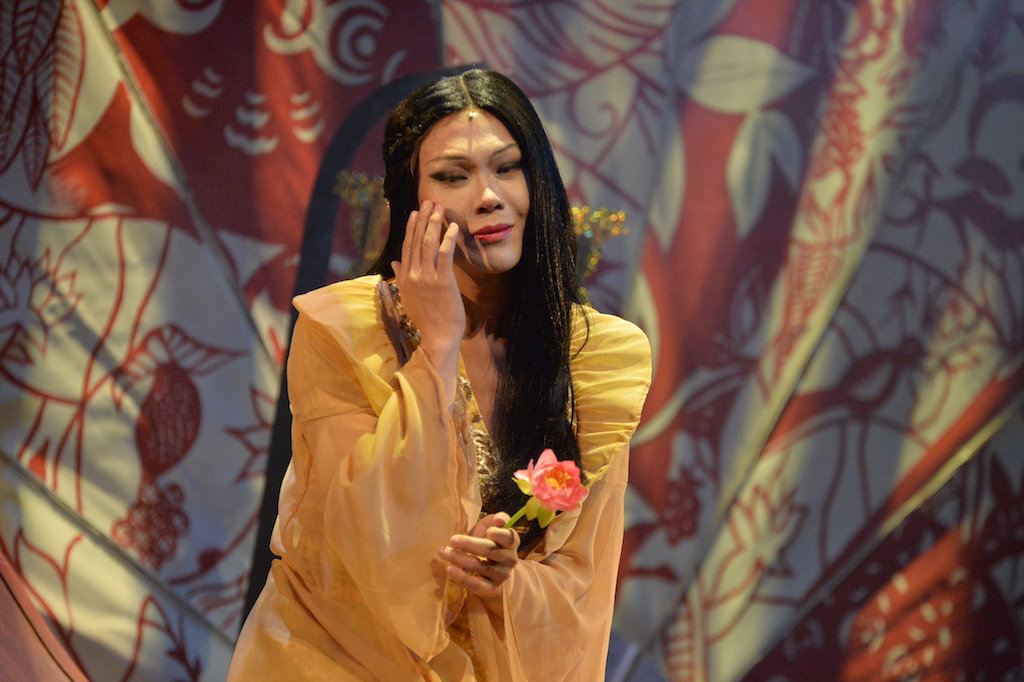
REVIEW: It’s a feeble, flawed “M. Butterfly”
Perhaps it’s good fortune that Olivier Borten’s performance of Rene Gallimard in this staging of “M. Butterfly” is bereft of charisma, because otherwise David Henry Hwang’s 80s play about a French diplomat being duped into an affair by a male Chinese spy would plainly show its age. It’s 2018, and what was then a provocative piece challenging sexual identity is today a relic of past sensibilities that are growing increasingly inaccurate–yes, even in comparably conservative Manila.
The things that still ring true (perpetuated, rather) are the Eastern and Western differences explored in the story. Director Kanakan Balintagos felt it crucial to cast white actors in white roles for the Philippine production. Visually, it makes sense, as a homogeneous cast might have diluted the potency of the West vs East dichotomy. But Borten’s (a French-born actor / teacher) undertaking of the role is only effective in the most cosmetic of ways. His Gallimard is a bumbling stooge; there is no more question of how Song could have fooled him so well and for so long, but more a confusion as to why: why were all these beautiful feminine creatures trying to beguile him, sleep with him, or keep him around when he seems quite charmless?

Olivier Borten as Rene Gallimard and Pinky Amador as Helga
The material’s current relevance can only be gleaned through familiarity of Hwang’s master work beforehand, as Balintagos’s production doesn’t deliver much narrative clarity. Instead, he allows the cast their individual excesses. There is a lot of posturing, primarily by a performative RS Francisco as a coquettish Song Liling, who is the shiniest, most magnetic entity on stage and not for any sort of sterling performance (he is only comparably good next to Borten), but by design.
The central allure and mystery of “M. Butterfly” is curiously absent in this incarnation, not because we are explicitly told that Song is a man pretending to be a woman, but because much has been said about Francisco’s reprisal of a role he took on as a teenager nearly 30 years ago, and that he is the unequivocal star of these proceedings. Indeed, the production seemed to be angled towards Francisco whether purposely or by happenstance due to the lackluster performances that surround him. He is also always clad in some scene-stealing garb (Eric Pineda is Costume Designer), whether as a purportedly modest and delicate Chinese opera singer, or a punkish male spy once his identity was revealed.
That this is very much, very obviously The Song Liling Show would not be much of an issue, if Hwang’s material was congruous to that same intent–but it isn’t, because “M. Butterfly” is still Gallimard’s story, told largely (and with Borten’s portrayal, laboriously) in his point of view. Borten’s performance, then, was the most essential and yet the least compelling, with a pointed lack of chemistry with everyone, from his superfluous friend (an equally lousy Lee O’Brian) and the young woman he hooks up with (played by Maya Encila, who is one of the show’s stronger performers, and even then her acting felt put on), to his wife, Helga (a staid, nearly apathetic Pinky Amador). In fact, the cast seemed to act independently of each other, instead of collaborating to present a cohesive story.

Maya Encila as Rene
This incarnation has reduced “M. Butterfly” to mere convoluted romantic espionage, and attempts to shock at the end, with Francisco stripping naked in a moment of supposed revelation–to both Gallimard and the audience–of the truth about his identity. Instead, it only felt gratuitous, and daring only to audiences who have never seen a man strip on stage before.
Ohm David’s set, a giant slab of cracked concrete, was more symbolic than functional, with giant painted hand fans that are the show’s most pleasing features. Joed Balsamo’s score was alternatively beautiful and grating. This seems to be a recurring theme through all aspects of the staging and material: elements of delicate, calculated beauty, concurrent with rough, bungling performances.
Like its eponymous creature, this “M. Butterfly” is pretty to look at, and yet flutters feebly.

